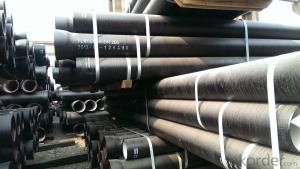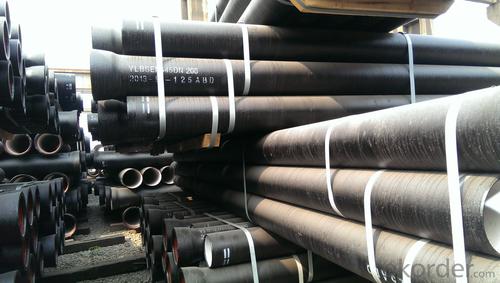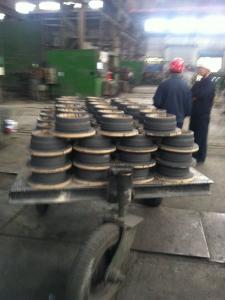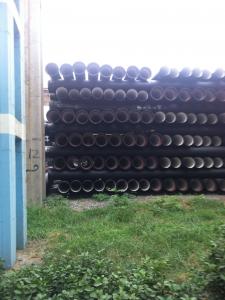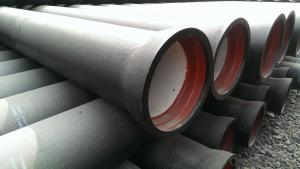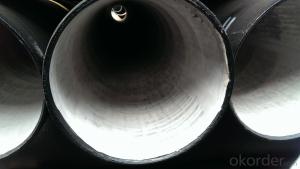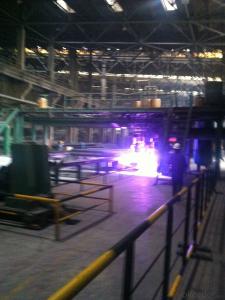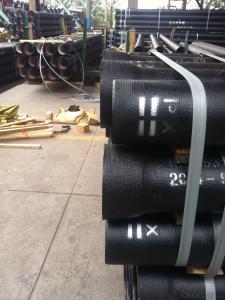DUCTILE IRON PIPES AND PIPE FITTINGS K7 DN450
- Loading Port:
- Tianjin
- Payment Terms:
- TT OR LC
- Min Order Qty:
- 25 m.t
- Supply Capability:
- 30000 m.t/month
OKorder Service Pledge
OKorder Financial Service
You Might Also Like
Material : Ductile Cast Iron
Size Range : DN 80mm to DN 2000mm
Unit Effective Length : 6m or 5.7m
Manufacture Standard: ISO 2531:1998/ EN 545:2006/EN 598:2007
Annual capacity : 200,000 tons
Coating Exterior: Zinc 130g/m2 according to ISO 8179-1 and bitumen coating 70 microns.
Cement Interior: Portland Cement/ High Alumina Cement/ Sulphate Resisting Cement Lining according to ISO 4179
Special requirements on external coating and internal lining can be applied
We also provide accessories such as SBR/EPDM rubber gaskets, lubricant paste, pipe caps, PE sleeves, etc.
Additional Parts:
Each pipe is strictly inspected according to related standard to ensure permanently high performance.
Easy Installation at site and service free for life
Long Service Lifespan
Quotation will arrive you within 24hours once we get your inquiry.
We guarantee offering you a competitive price.
A copy of original inspection reports of pipes will be offered after shipment.
Photos of loading process will be sent to the customer after shipment effect.
We will follow-up the delivery progress after shipment effect and update to the customer on weekly basis.
- Q: How does ductile iron pipe perform in seismic conditions?
- Ductile iron pipe is known for its excellent performance in seismic conditions. It has proven to be a reliable and durable choice for underground water and wastewater systems, especially in areas prone to earthquakes. The inherent strength and flexibility of ductile iron pipe make it highly resistant to seismic forces. It can withstand ground movements and vibrations caused by earthquakes without significant damage or failure. This is due to its unique composition, which includes a high percentage of iron combined with small amounts of carbon and other alloying elements. The ductile iron pipe's ability to absorb and dissipate seismic energy through its inherent flexibility is crucial in seismic conditions. When the ground shifts during an earthquake, the pipe can adjust and deform slightly to accommodate the movement, thus minimizing stress concentrations and the risk of fractures. Moreover, ductile iron pipe has excellent joint integrity, which is vital in seismic conditions. The joints are designed to provide maximum strength and resistance against external forces, including seismic activity. Various joint types, such as push-on, mechanical, and restrained joints, are available to suit different seismic requirements and installation conditions. In addition to its mechanical properties, ductile iron pipe also offers long-term corrosion resistance. It is typically lined with a cement mortar or a protective coating, which acts as a barrier against corrosive elements in the soil or water. This corrosion resistance ensures the pipe's structural integrity and longevity, even in areas with high seismic activity. Overall, ductile iron pipe has a proven track record of performing exceptionally well in seismic conditions. Its strength, flexibility, joint integrity, and corrosion resistance make it a reliable choice for underground infrastructure, providing safe and efficient water and wastewater systems in earthquake-prone regions.
- Q: How can 4 inch ductile iron pipe be connected with 2 inch galvanized pipe?
- The hot dip galvanized welded steel pipe galvanized pipe, galvanized pipe by welding without taking anti rusting measures (furnace welding and welding) steel pipe, seamless steel pipe or other metal pipe of the clarinet, process of hot dip galvanizing, the outer coating and galvanized layer to long-term corrosion of the steel pipe after processing.
- Q: What is the purpose of ductile iron pipes?
- The purpose of ductile iron pipes is to provide a strong and durable infrastructure for transporting various fluids, including water, sewage, and industrial materials. Their high tensile strength and flexibility make them ideal for withstanding high-pressure conditions, resisting corrosion, and accommodating ground movements, ensuring efficient and reliable delivery of essential resources.
- Q: Can ductile iron pipes be used for underground storage tanks?
- Under specific circumstances, ductile iron pipes are appropriate for underground storage tanks. This material possesses strength and durability, effectively resisting corrosion and making it a suitable option for underground applications. Nevertheless, several factors must be taken into account before implementing ductile iron pipes for underground storage tanks. First and foremost, it is vital to evaluate the project's precise demands and regulations. Different regions and industries may enforce specific guidelines regarding the materials used in underground storage tanks. It is imperative to ascertain that ductile iron pipes comply with these regulations and meet the required standards for underground storage. Secondly, the size and capacity of the storage tank must be considered. Ductile iron pipes are available in various sizes, but their dimensions may not be suitable for large-scale storage tanks due to limitations. Consulting engineers or experts is necessary to determine the appropriate pipe size and capacity for the specific storage requirements. Lastly, the design and installation of the underground storage tank necessitate careful planning. Adequate measures should be taken to seal and protect against external factors such as soil movements, water pressure, or other potential hazards. Preventive actions should be implemented to avoid leaks or damage to the pipes, ensuring the safety and longevity of the storage tank. In conclusion, ductile iron pipes can be utilized for underground storage tanks, but it is crucial to consider the specific requirements, regulations, sizing limitations, and proper design and installation. Seeking guidance from professionals in the field and adhering to industry standards will ensure successful implementation of ductile iron pipes for underground storage tanks.
- Q: What does ductile iron pipe "K" mean?
- 1 、 pipe fittings are K type, T type, etc.;2 wall thickness registration symbol. For example, according to the pipe quality standards GB/T13295-K9, which is the wall thickness ofK=9* (DN/1000+0.5)
- Q: What is the weight of ductile iron pipes?
- The weight of ductile iron pipes can vary depending on their size and wall thickness. On average, a 10-foot length of 6-inch diameter ductile iron pipe can weigh approximately 180 pounds. However, it is important to note that different manufacturers may have slight variations in weight due to differences in manufacturing processes and materials used. It is recommended to consult specific product specifications or contact the manufacturer for accurate weight information.
- Q: How does ductile iron pipe compare to steel pipe in terms of durability?
- Ductile iron pipe and steel pipe both have their own unique characteristics, but in terms of durability, ductile iron pipe has several advantages over steel pipe. Firstly, ductile iron pipe is highly resistant to corrosion. It has a protective layer of zinc or cement lining that prevents rust and corrosion, making it more durable and less prone to leaks or failures. On the other hand, steel pipe is susceptible to corrosion, especially when exposed to moisture or certain chemicals. This can lead to structural issues and decrease its overall durability. Secondly, ductile iron pipe has excellent impact resistance. It can withstand heavy loads and external pressures without cracking or breaking. This makes it suitable for applications in areas with high traffic or where the pipe may be subject to accidental impacts. Steel pipe, although strong, can be more brittle and prone to fractures under similar conditions. Additionally, ductile iron pipe has a longer service life compared to steel pipe. It has been known to last for over 100 years with proper maintenance, making it a reliable and durable choice for infrastructure projects. Steel pipe, while still durable, may require more frequent inspections and maintenance to ensure its longevity. Overall, ductile iron pipe surpasses steel pipe in terms of durability due to its corrosion resistance, impact resistance, and longer service life. However, the choice between the two ultimately depends on the specific application, budget, and other project requirements.
- Q: How do ductile iron pipes handle seismic movements?
- Ductile iron pipes are renowned for their exceptional capacity to handle seismic movements, owing to their distinctive properties and construction. This renders them remarkably resistant to stress and deformation caused by ground vibrations during earthquakes. One of the primary merits of ductile iron pipes lies in their superior tensile strength, enabling them to endure substantial forces without succumbing to breakage or rupture. When seismic movements occur, these pipes exhibit flexibility and absorb the energy generated by the ground vibrations, thereby minimizing the risk of damage or failure. Moreover, ductile iron pipes possess exemplary resilience, allowing them to revert to their original shape after being subjected to external forces. This characteristic empowers the pipes to adapt to ground movements during earthquakes, effectively diminishing the likelihood of fractures or leaks. Furthermore, ductile iron pipes boast considerable ductility, enabling them to deform without fracturing. This attribute proves crucial during seismic events, as it enables the pipes to absorb the energy generated by ground vibrations by deforming and subsequently returning to their original shape once the seismic activity subsides. In order to further enhance their capacity to handle seismic movements, ductile iron pipes are frequently designed and installed with flexible joints. These joints grant the pipes the ability to move and adjust to ground movements, offering additional safeguards against damage or failure. In conclusion, ductile iron pipes have demonstrated their extraordinary reliability and resilience in withstanding seismic movements. Their combination of high tensile strength, resilience, and ductility make them an optimal choice for regions prone to earthquakes, ensuring the safety and durability of fluid transportation systems.
- Q: Can ductile iron pipes be used for stormwater drainage systems?
- Indeed, stormwater drainage systems can utilize ductile iron pipes. These pipes are renowned for their strength, durability, and resistance to corrosion, rendering them appropriate for various applications, including stormwater drainage. They possess the capacity to accommodate substantial water flow and endure heavy traffic loads, making them a reliable selection for stormwater management. Moreover, ductile iron pipes exhibit exceptional joint performance, guaranteeing a watertight and secure connection, a critical aspect in preventing leaks and preserving the integrity of the stormwater drainage system. All in all, due to their sturdiness, longevity, and ability to withstand the challenging conditions typically associated with stormwater management, ductile iron pipes present a viable choice for stormwater drainage systems.
- Q: How are ductile iron pipes protected from external damage?
- Ductile iron pipes are protected from external damage through the application of protective coatings. These coatings act as a barrier, shielding the pipes from corrosion and other forms of external damage. Additionally, the pipes may be encased in concrete or installed in a casing pipe to provide further protection against external forces and impacts.
Send your message to us
DUCTILE IRON PIPES AND PIPE FITTINGS K7 DN450
- Loading Port:
- Tianjin
- Payment Terms:
- TT OR LC
- Min Order Qty:
- 25 m.t
- Supply Capability:
- 30000 m.t/month
OKorder Service Pledge
OKorder Financial Service
Similar products
Hot products
Hot Searches
Related keywords
